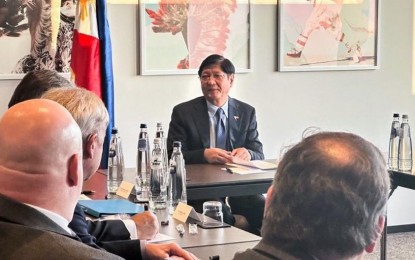
MARITIME MEETING. President Ferdinand R. Marcos Jr. meets with International Maritime Employers’ Council (IMEC) Chief Executive Officer (CEO) Francisco Gargiulo and several business executives and leaders of European shipping companies and shipowners associations in Brussels, Belgium on Tuesday (Dec. 13, 2022). Marcos ordered the creation of an advisory board to address deficiencies identified by the European Union (EU) in the Philippine seafarers’ education, training and certification system. (Photo courtesy of the Office of the Press Secretary)
MANILA – President Ferdinand R. Marcos Jr. on Tuesday ordered the creation of an advisory board to address deficiencies identified by the European Union (EU) in the Philippine seafarers’ education, training and certification system.
In a press release, Malacañang said Marcos issued the directive during a meeting with International Maritime Employers’ Council (IMEC) Chief Executive Officer (CEO) Francisco Gargiulo and several business executives and leaders of European shipping companies and shipowners associations in Brussels, Belgium.
Marcos said he wanted members of the board to consist of representatives from government agencies, international shipowners and other stakeholders.
He likewise assured EU transport officials that the Philippines continues to address maritime industry issues to make the country compliant with the Standards of Training, Certification and Watchkeeping (STCW) Convention.
“Our seafarers are of great importance to the Philippines in many, many ways. Although we recognize that in the last many years, the Philippines has done very well in terms of being the leading seafarers around the world. However, with the changing situation after the pandemic, with the changing situation especially when we talk about supply line problems, all of these areas have to be revisited,” he said during the meeting.
“That comes with the training, changes in the curriculum, all of these things have to be ascertained,” he added.
Department of Migrant Workers (DMW) Secretary Susan “Toots” Ople said Republic Act No. 11641 (RA) identifies the establishment of an advisory body to assess training and qualifications.
“Under the law creating the Department of Migrant Workers, we checked and there’s a provision there that the department can actually form or create advisory bodies with the participation of key stakeholders including employers and in this case the international shipowners,” she said.
She said her department can meet on a regular basis with the Maritime Industry Authority (MARINA), Commission on Higher Education (CHED), and other relevant institutions to ensure that the country’s training initiatives and accreditation scheme for seafarers would pass the standards of the EU.
Meanwhile, Marcos also assured that his administration continues to strengthen the relationship between the public and private sectors in efforts to boost the Philippine seafaring industry.
“Perhaps we can develop that idea further especially when it comes to training. We have always regarded our seafarers,” he said.
He also thanked IMEC for reinforcing Manila and the EU’’s strong working relationship.
Earlier this year, the European Commission’s Maritime Safety Agency (EMSA) flagged the Philippines for deficiencies in local seafarer education, training and certification.
Marcos on Sunday assured that his administration will do “everything” to address these deficiencies to prevent job losses among Filipino seafarers deployed to work for EU vessels.
MARINO Party-list Representative Sandro Gonzalez on Tuesday agreed with President Marcos that this is the country's "last chance" to rectify the EMSA findings, highlighting that 50,000 Filipino seafarers working in European vessels risk job loss.
"There are more than 50,000 seafarers who are endangered of losing their jobs in Europe-based shipping companies if the PH government do not act upon it as soon as possible," Gonzalez said. "This issue has been open for years and we are still navigating our way on how to resolve it effectively."
He said Filipino seafarers continue to be an asset to the country's economy, as he expressed hope that Marcos will remain consistent in putting forward his support to the sector, especially in presenting his priority agenda with other countries.
"Let us remind ourselves that Pinoy seamen are the most preferred internationally, and we must be proactive in protecting their welfare and job opportunities," Gonzalez said.
The Philippines remains the top provider of seafarers for both officers and ratings, across all departments, aboard merchant cargo vessels, according to a United Nations Conference on Trade and Development (UNCTAD) 2021 study.
In 2021, Filipino seafarers remitted a total of USD6.54 billion from USD6.353 billion in 2020, or an increase of 3 percent, making them a significant contributor to the country’s economy.
IMEC is the only international employers’ organization dedicated to maritime industrial relations, according to its website. It operates from its offices in the Philippines and United Kingdom, and represents 250 shipping companies located across the globe.
Currently, IMEC has an estimated 300,000 seafarers in employment and more than 12,000 shipping vessels registered from 60 different countries. (with reports from Filane Mikee Cervantes/PNA)
